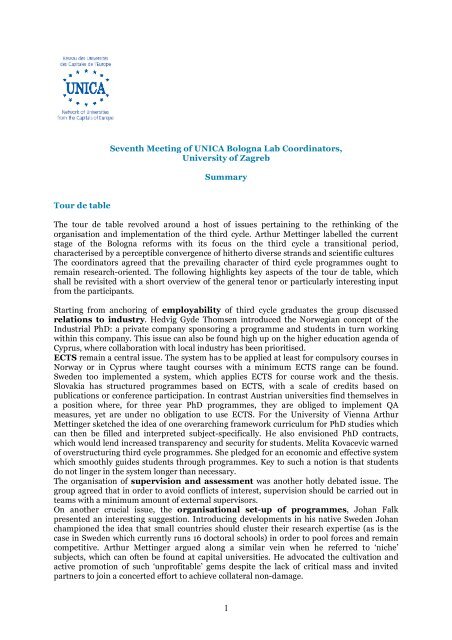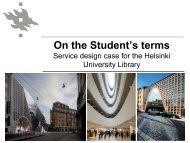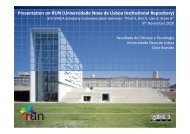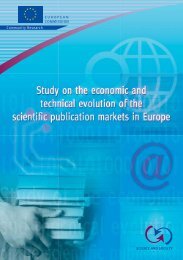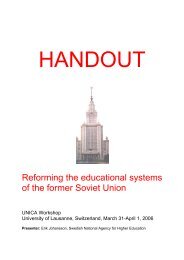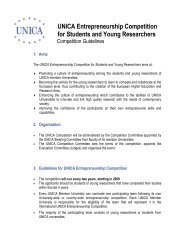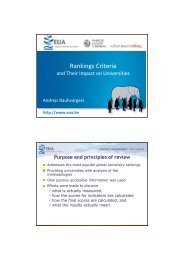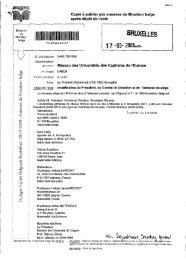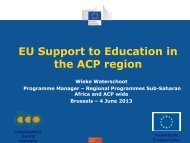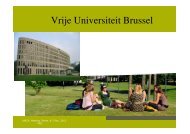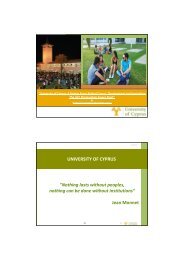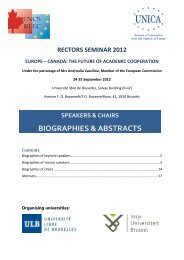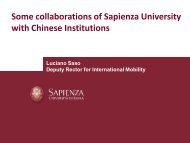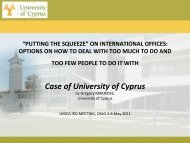Summary of the meeting - UNICA
Summary of the meeting - UNICA
Summary of the meeting - UNICA
You also want an ePaper? Increase the reach of your titles
YUMPU automatically turns print PDFs into web optimized ePapers that Google loves.
Seventh Meeting <strong>of</strong> <strong>UNICA</strong> Bologna Lab Coordinators,<br />
University <strong>of</strong> Zagreb<br />
<strong>Summary</strong><br />
Tour de table<br />
The tour de table revolved around a host <strong>of</strong> issues pertaining to <strong>the</strong> rethinking <strong>of</strong> <strong>the</strong><br />
organisation and implementation <strong>of</strong> <strong>the</strong> third cycle. Arthur Mettinger labelled <strong>the</strong> current<br />
stage <strong>of</strong> <strong>the</strong> Bologna reforms with its focus on <strong>the</strong> third cycle a transitional period,<br />
characterised by a perceptible convergence <strong>of</strong> hi<strong>the</strong>rto diverse strands and scientific cultures<br />
The coordinators agreed that <strong>the</strong> prevailing character <strong>of</strong> third cycle programmes ought to<br />
remain research-oriented. The following highlights key aspects <strong>of</strong> <strong>the</strong> tour de table, which<br />
shall be revisited with a short overview <strong>of</strong> <strong>the</strong> general tenor or particularly interesting input<br />
from <strong>the</strong> participants.<br />
Starting from anchoring <strong>of</strong> employability <strong>of</strong> third cycle graduates <strong>the</strong> group discussed<br />
relations to industry. Hedvig Gyde Thomsen introduced <strong>the</strong> Norwegian concept <strong>of</strong> <strong>the</strong><br />
Industrial PhD: a private company sponsoring a programme and students in turn working<br />
within this company. This issue can also be found high up on <strong>the</strong> higher education agenda <strong>of</strong><br />
Cyprus, where collaboration with local industry has been prioritised.<br />
ECTS remain a central issue. The system has to be applied at least for compulsory courses in<br />
Norway or in Cyprus where taught courses with a minimum ECTS range can be found.<br />
Sweden too implemented a system, which applies ECTS for course work and <strong>the</strong> <strong>the</strong>sis.<br />
Slovakia has structured programmes based on ECTS, with a scale <strong>of</strong> credits based on<br />
publications or conference participation. In contrast Austrian universities find <strong>the</strong>mselves in<br />
a position where, for three year PhD programmes, <strong>the</strong>y are obliged to implement QA<br />
measures, yet are under no obligation to use ECTS. For <strong>the</strong> University <strong>of</strong> Vienna Arthur<br />
Mettinger sketched <strong>the</strong> idea <strong>of</strong> one overarching framework curriculum for PhD studies which<br />
can <strong>the</strong>n be filled and interpreted subject-specifically. He also envisioned PhD contracts,<br />
which would lend increased transparency and security for students. Melita Kovacevic warned<br />
<strong>of</strong> overstructuring third cycle programmes. She pledged for an economic and effective system<br />
which smoothly guides students through programmes. Key to such a notion is that students<br />
do not linger in <strong>the</strong> system longer than necessary.<br />
The organisation <strong>of</strong> supervision and assessment was ano<strong>the</strong>r hotly debated issue. The<br />
group agreed that in order to avoid conflicts <strong>of</strong> interest, supervision should be carried out in<br />
teams with a minimum amount <strong>of</strong> external supervisors.<br />
On ano<strong>the</strong>r crucial issue, <strong>the</strong> organisational set-up <strong>of</strong> programmes, Johan Falk<br />
presented an interesting suggestion. Introducing developments in his native Sweden Johan<br />
championed <strong>the</strong> idea that small countries should cluster <strong>the</strong>ir research expertise (as is <strong>the</strong><br />
case in Sweden which currently runs 16 doctoral schools) in order to pool forces and remain<br />
competitive. Arthur Mettinger argued along a similar vein when he referred to ‘niche’<br />
subjects, which can <strong>of</strong>ten be found at capital universities. He advocated <strong>the</strong> cultivation and<br />
active promotion <strong>of</strong> such ‘unpr<strong>of</strong>itable’ gems despite <strong>the</strong> lack <strong>of</strong> critical mass and invited<br />
partners to join a concerted effort to achieve collateral non-damage.<br />
1
Zdravko Lackovic pointed to current and future challenges when he identified three diverse<br />
pulls which all affect <strong>the</strong> development and embedding <strong>of</strong> PhD structures within a broader<br />
context. The demand to generate more PhD candidates, <strong>the</strong> need to constantly increase <strong>the</strong><br />
quality <strong>of</strong> third cycle programmes and <strong>the</strong>ir graduates and finally, <strong>the</strong> new three-year<br />
structure. The consolidation <strong>of</strong> PhD programmes will have to give satisfying answers to all<br />
three.<br />
Arthur Mettinger concluded that <strong>the</strong> <strong>UNICA</strong> Bologna Lab was ideally placed to compose a list<br />
<strong>of</strong> decisive points, which potentially inform students’ decision for picking a certain university.<br />
He argued for incentivising tight structures in a bid to attract <strong>the</strong> brightest minds available.<br />
Information policy and transparency <strong>of</strong> third cycle programmes at <strong>the</strong><br />
University <strong>of</strong> Bergen<br />
In her presentation Gry Kibsgaard <strong>of</strong> <strong>the</strong> University <strong>of</strong> Bergen argued that European<br />
universities’ ambition to reach <strong>the</strong>ir research goals through high quality doctoral<br />
programmes needs to be substantiated by corresponding strategic moves. Some <strong>of</strong> <strong>the</strong>se have<br />
been laid down in <strong>the</strong> Banff Meeting in June 2007. This <strong>meeting</strong> called for a review <strong>of</strong> <strong>the</strong><br />
global flow <strong>of</strong> graduate students and postdoctoral fellows (early stage researchers).<br />
Fur<strong>the</strong>rmore it was agreed upon to clarify and streng<strong>the</strong>n <strong>the</strong> role <strong>of</strong> masters degree (success<br />
in masters a prerequisite for success in PhD-programs). In her presentation Kibsgaard<br />
argued that transparency was only possible with a clear strategy, a well-documented set <strong>of</strong><br />
rules, regulations and plans for doctoral training. Once this set has been concurred a<br />
university needs to decide which information should be communicated. Questions to answer<br />
might include: Which model <strong>of</strong> doctoral training is in place? Which research areas do you<br />
have, strenghts, cooperation with industry (future career moves for prospective PhDstudents).<br />
Information and transparency <strong>the</strong>re<strong>of</strong> are intrinsically strategic questions. Thus<br />
Kibsgaard urged universities to answer <strong>the</strong>se questions convincingly before setting out to<br />
shape <strong>the</strong>ir public pr<strong>of</strong>ile. One <strong>of</strong> <strong>the</strong>se initial strategic questions is whe<strong>the</strong>r a university aims<br />
to communicate doctoral training as research, as education, or as both research and<br />
education?<br />
Answering this question will provide a formative guideline for <strong>the</strong> ensuing information<br />
strategy concerning third cycle programmes. The presentation went on to list crucial areas to<br />
consider. These included admission, assessment, supervision, mobility and potential career<br />
possibilities. Prospective students are looking for<br />
accessible information on websites, with English manguage information as <strong>the</strong><br />
minimum criteria <strong>of</strong> accessability<br />
research opportunities (Info about PhD linked to research)<br />
names and faces <strong>of</strong> <strong>the</strong> prospective <strong>the</strong> research team (who will I be working with?)<br />
<strong>the</strong> nature <strong>of</strong> <strong>the</strong> doctoral training; programs, courses, mobility, funding?<br />
Application procedures<br />
admission criteria<br />
funding opportunities<br />
career opportunities after PhD<br />
info on <strong>the</strong> university in general<br />
facts about <strong>the</strong> city<br />
In concluding Kibsgaard advised <strong>the</strong> coordinators to avoid overregulation, but seek<br />
abundance in information and transparency in doctoral training.<br />
2
Long term experience with European PhD programmes<br />
Annamaria de Rosa’s presentation drew from her extensive expertise <strong>of</strong> <strong>the</strong> European PhD on<br />
Social Representations and Communication. The programmes’ website is characterised by an<br />
integrated structure between virtual and actual mobility.<br />
Historically <strong>the</strong> programme was launched in 1996 when <strong>the</strong> first students enrolled. As a<br />
bottom-up initiative <strong>the</strong> European PhD on Social Representations and Communication<br />
started with cooperation among <strong>the</strong> scientific community before moving up <strong>the</strong> university<br />
hierarchy.<br />
De Rosa described <strong>the</strong> programme as a real joint project with joint procedures, not merely a<br />
complementary effort. A major advantage <strong>of</strong> <strong>the</strong> programme is <strong>the</strong> students’ choice <strong>of</strong> a range<br />
<strong>of</strong> researchers organised in research groups. They can stay in two different European<br />
universities, and make use <strong>of</strong> virtual mobility and a modern web auditorium. Transferable<br />
skills are explicitly integrated and linked to research work. The PhD programme regularly<br />
invites pr<strong>of</strong>essionals from certain fields, such as rhetoric coaches, in order to capitalise on<br />
input from pr<strong>of</strong>essionals outside academia proper.<br />
Working Session 1 on <strong>the</strong> integration <strong>of</strong> transferable skills<br />
Definition<br />
The <strong>UNICA</strong> Bologna-Lab defines transferable skills broadly as skills useful and applicable<br />
outside <strong>the</strong> immediate context <strong>of</strong> acquisition. It anchors transferable skills on <strong>the</strong> three<br />
following levels 1 :<br />
1. Knowledge and insights<br />
2. Ability and skills<br />
3. Judgement and attitude<br />
These three dimensions should be embedded and mirrored throughout each <strong>of</strong> <strong>the</strong> three<br />
cycles. The accentuation <strong>of</strong> transferable skills will change and progress from Bachelor to<br />
Master to PhD studies.<br />
The need to assess and evaluate <strong>the</strong>ir successful acquisition might constitute a potential<br />
dilemma <strong>of</strong> transferable skills. In order to steer clear <strong>of</strong> <strong>the</strong> pitfalls <strong>of</strong> narrow-minded<br />
interpretations <strong>of</strong> learning outcomes assessment <strong>the</strong> <strong>UNICA</strong> Bologna-Lab recommends a<br />
pragmatic approach. This might entail <strong>the</strong> practice <strong>of</strong> three or more supervisors or new<br />
overarching forms <strong>of</strong> examination.<br />
Approach<br />
Two dimensions characterise <strong>the</strong> <strong>UNICA</strong> Bologna-Lab approach:<br />
1. The strife to establish a dialogue with curriculum developers to identify <strong>the</strong> skills students<br />
acquire in <strong>the</strong> course <strong>of</strong> <strong>the</strong>ir academic work. These relate to <strong>the</strong> fields, methodologies and<br />
traditions <strong>of</strong> academic areas.<br />
2. Definition <strong>of</strong> skills linked to <strong>the</strong> academic work but not emanating from it exclusively. It<br />
is <strong>the</strong> responsibility <strong>of</strong> <strong>the</strong> institutions to develop instruments to help students acquire<br />
transferable skills <strong>of</strong> this category.<br />
In <strong>the</strong> future EHEA students will enter <strong>the</strong> labour market (be it within or outside academia)<br />
advertising not only <strong>the</strong>ir subject-specific skills but also <strong>the</strong> quality and range <strong>of</strong> <strong>the</strong><br />
transferable skills <strong>the</strong>y picked up at. This fur<strong>the</strong>r integration <strong>of</strong> transferable skills works in<br />
tandem with awareness-raising efforts which include <strong>the</strong> highlighting <strong>of</strong> what is already<br />
1 As suggested by <strong>the</strong> Swedish National Qualifications Framework<br />
3
embedded in programs. Transferable skills will come to play a part in <strong>the</strong> PR <strong>of</strong> institutions<br />
and feed into <strong>the</strong>ir branding activities. As <strong>the</strong>re is no one-size-fits-all approach financial<br />
burdens might arise. Especially on PhD level universities might be able to mitigate <strong>the</strong>se by<br />
considering a closer alignment <strong>of</strong> personnel management courses and <strong>of</strong>fers <strong>of</strong> fur<strong>the</strong>r<br />
training with PhD student courses.<br />
Institutions have to do some soul-searching at this point. Unless <strong>the</strong>y clarify <strong>the</strong> boundaries<br />
<strong>of</strong> <strong>the</strong>ir responsibility for PhD students, <strong>the</strong>ir capacity to define sets <strong>of</strong> transferable skills<br />
remains hampered. Universities still grapple with <strong>the</strong> organisation <strong>of</strong> <strong>the</strong>ir third cycle<br />
programs. They are not yet sufficiently confident about <strong>the</strong>se programs’ status, which renders<br />
<strong>the</strong> successful distribution and <strong>the</strong> embedding <strong>of</strong> transferable skills unattainable.<br />
A university responsibility<br />
The <strong>UNICA</strong> Bologna-Lab considers it a central responsibility <strong>of</strong> a modern European<br />
university to arrange and cater for <strong>of</strong>fers in <strong>the</strong> field <strong>of</strong> transferable skills. Topics could<br />
include research leadership, applications for funding, scientific communication, <strong>the</strong><br />
interaction <strong>of</strong> science and society, Creativity, <strong>the</strong> capacity to think outside <strong>the</strong> box, or<br />
academic writing skills. Research experience itself is identified as a valuable asset for life both<br />
within and outside academia. The capacity to cope with failure distinguishes PhD students in<br />
particular.<br />
These <strong>of</strong>fers ought to be organised with a view to avoiding unyielding structures as students’<br />
transferable skills needs are by definition highly individualised. Therefore it is imperative to<br />
design paths to a personal transferable skills portfolio flexibly. Offers have to be designed so<br />
as to accommodate <strong>the</strong> heterogeneous abilities and subject backgrounds <strong>of</strong> a university’s<br />
student population.<br />
<strong>UNICA</strong> Bologna-Lab observations<br />
There is currently no encompassing strategy to synchronise and calibrate <strong>the</strong> integration <strong>of</strong><br />
transferable skills throughout <strong>the</strong> three cycles.<br />
There is currently no Bologna-Lab member institution which systematically involves labour<br />
market representatives in transferable skills design and integration.<br />
4
Working session 2 – Internationally-oriented third cycle programmes and <strong>the</strong><br />
<strong>UNICA</strong> European Campus<br />
The group debated <strong>the</strong> Eramus Mundus 2008 spring call. Johan Falk briefly sketched <strong>the</strong><br />
status quo <strong>of</strong> <strong>the</strong> PhD Multilingualism initiative. Mettinger reported <strong>the</strong> outcomes <strong>of</strong> a<br />
<strong>meeting</strong> with Commissioner Orban where, among o<strong>the</strong>r projects, <strong>the</strong> Multilingualism PhD.<br />
In <strong>the</strong> context <strong>of</strong> <strong>the</strong> future set-up <strong>of</strong> <strong>the</strong> <strong>UNICA</strong> European Campus Gry Kibsgaard urged <strong>the</strong><br />
Coordinators to define a recognisable <strong>UNICA</strong> identity. She recommended for <strong>UNICA</strong> to find a<br />
gap <strong>UNICA</strong> can fill, especially when bearing in mind that <strong>UNICA</strong> universities are <strong>of</strong>ten<br />
responsible for upholding a country’s characteristic academic culture and heritage.<br />
Annamaria de Rosa championed a better dissemination <strong>of</strong> internationally-oriented<br />
programmes and <strong>the</strong> designing <strong>of</strong> a brochure as an inventory <strong>of</strong> existing initiatives. She also<br />
spoke out for an agreed upon <strong>UNICA</strong> standard <strong>of</strong> information politics. Mettinger joined her<br />
by emphasising <strong>UNICA</strong>’s strength <strong>of</strong> diversity based on an agreement on standards <strong>of</strong><br />
transparency and information. These would safeguard <strong>the</strong> label <strong>of</strong> <strong>UNICA</strong>’s top quality joint<br />
degree programmes.<br />
<strong>UNICA</strong> is in a unique position to answer European challenges (Sweden and Denmark both<br />
have climate-focussed programmes)– a vital means <strong>of</strong> branding <strong>UNICA</strong>. De Rosa fur<strong>the</strong>r<br />
argued that <strong>UNICA</strong> should valorise its history <strong>of</strong> successful EC recognition.<br />
Johan Falk argued for a combined bottom-up (letters to heads <strong>of</strong> departments to boost<br />
topical clusters) and top-down (implementation <strong>of</strong> joint schools as a network initiative) in readdressing<br />
<strong>the</strong> European Campus idea.<br />
Arthur Mettinger went on to identify three tasks at hand<br />
1. Build an inventory <strong>of</strong> joint programmes (minimum <strong>of</strong> three <strong>UNICA</strong> institutions) by<br />
May 30, 2008. The inventory should <strong>the</strong>n be discussed with <strong>the</strong> institutional<br />
leadership with a view to strategic development planning.<br />
2. The collection <strong>of</strong> existing Bachelor, Master and PhD cooperations, with information<br />
on <strong>the</strong>se programmes.<br />
3. Future development: identify areas <strong>of</strong> potential collaborations (possibly through<br />
bottom-up approaches) for excellent programmes. These topics will be special to<br />
<strong>UNICA</strong>, defining and accentuating <strong>the</strong> role as capital cities.<br />
By <strong>the</strong> time <strong>of</strong> <strong>the</strong> next <strong>meeting</strong> in Dubrovnik <strong>the</strong> discussion process within institutions<br />
should be reported on.<br />
Outlook<br />
The 8 th <strong>UNICA</strong> Bologna Lab Coordinators Meeting will take place on Thursday, July 3, 2008<br />
in Dubrovnik, Croatia. The arrivals would be July 2.<br />
Intended outcome: Mettinger envisaged an accorded action plan for Rectors as a desirable<br />
outcome <strong>of</strong> that <strong>meeting</strong>.<br />
Melita Kovacevic suggested that <strong>the</strong> organisation <strong>of</strong> third cycle programmes, doctoral schools<br />
versus individual programmes, should be addressed at <strong>the</strong> next <strong>meeting</strong>.<br />
Arthur Mettinger stated his preference for closer alignment <strong>of</strong> <strong>the</strong> Bologna Lab with <strong>the</strong><br />
group <strong>of</strong> Doctoral Studies and <strong>the</strong> EU Researchers. Future Bologna Lab agenda items will<br />
include<br />
Qualifications frameworks<br />
The social dimension<br />
Social integration <strong>of</strong> students with particular needs<br />
The synchronisation <strong>of</strong> academic calendars<br />
Quality assurance.<br />
5


